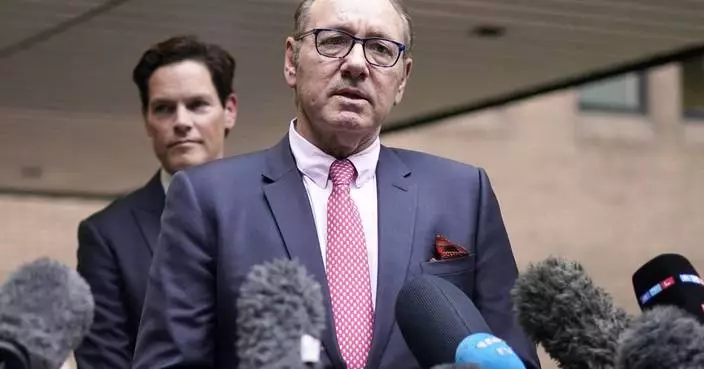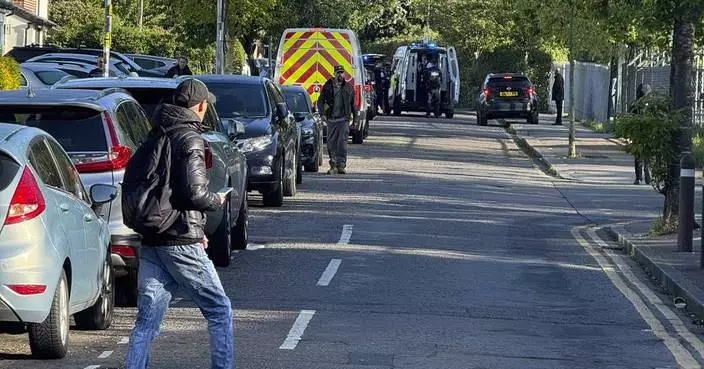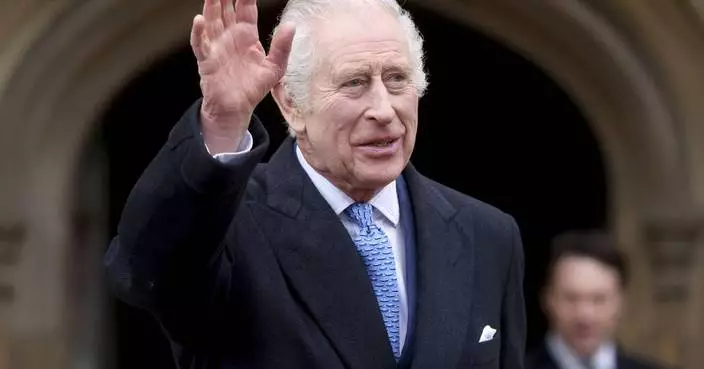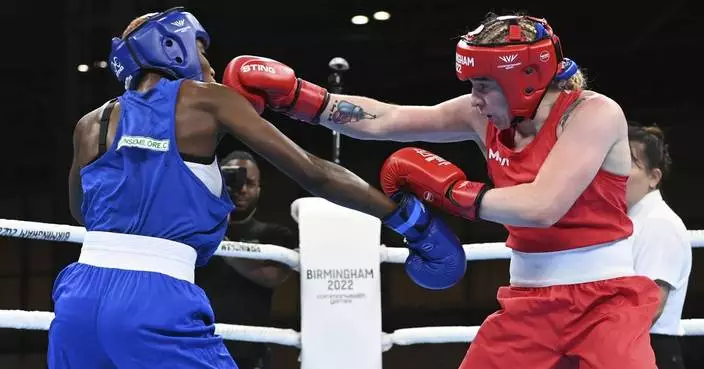It was so human. So accessible. So very Diana: Prince William, the heir to the British throne, sprinting down the track at London's Olympic Park with his wife, the Duchess of Cambridge, and his brother, Prince Harry, in a relay race this year promoting mental health.
There was a time when such a scene would not have happened.
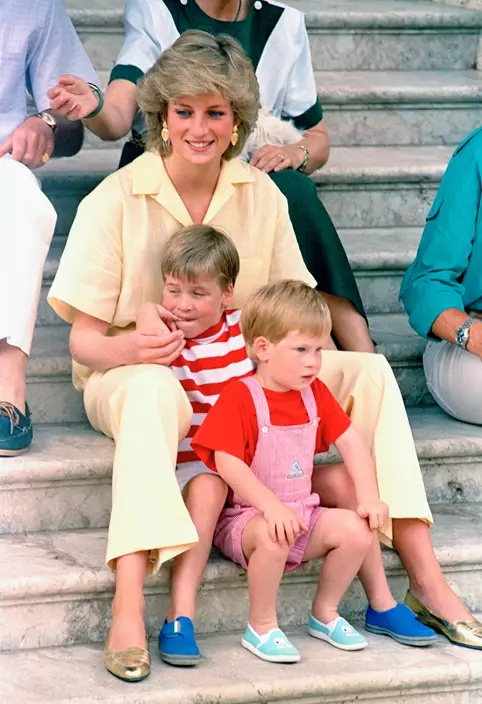
In this Aug. 9, 1987 file photo, Britain's Princess Diana of Wales smiles as she sits with her sons, Princes Harry, front, and William, on the steps of the Royal Palace on the island of Mallorca, Spain. (AP Photo/John Redman, File)
Princess Diana, a preschool teacher thrust into the glare of celebrity by her marriage to Prince Charles, dragged Britain's ribbon-cutting royals into the modern world. She made a direct connection with the public —once running her own race in a flowing white skirt and baggy sweater — and promoted causes far from the mainstream at the time, like land mine removal and AIDS research.
That link lives on through her sons, who have adopted their mother's more personal approach to monarchy and in the process reinvigorated the institution.
"She was the first royal who really took the public's heart," said Sandi McDonald, 55, standing outside an exhibit of the late princess' dresses at Kensington Palace. "I think her sons are the same — the public just loves them."
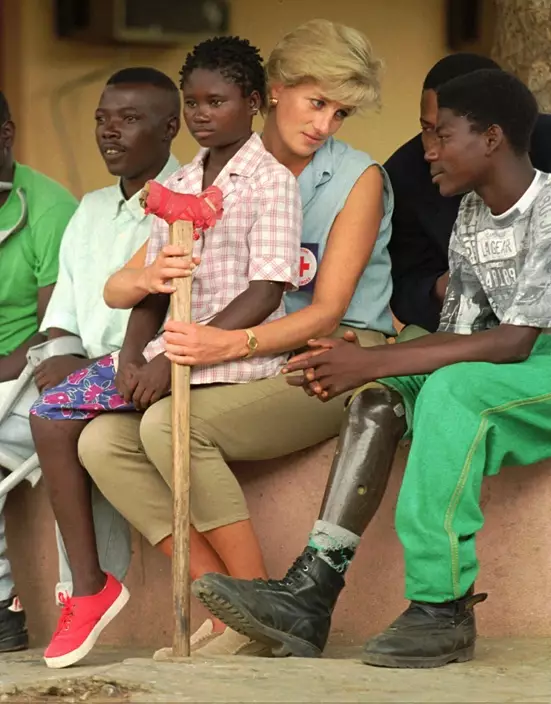
FILE - In this Tuesday, January 14, 1997 file photo, Britain's Diana, Princess of Wales, talks to amputees at the Neves Bendinha Orthopedic Workshop in the outskirts of Luanda, Angola. (AP Photo/Joao Silva, File)
William and Harry are the most obvious reminders of Diana's impact. They have spoken openly about their own mental health issues over losing their mother while so young and broken down taboos just as their mother did by embracing AIDS patients to ease fears about the disease. But the princess' most far-reaching legacy is her popularization of the idea that celebrities can use their ties to millions of people they've never met to bring about change.
Having been swallowed up by the royal machine when she was barely 20, Diana found her way in life after realizing that the public was fascinated by her every thought. She was able to manipulate that interest to promote causes such as land mine clearance and to tell her side of the story when her marriage collapsed amid Prince Charles' relationship with Camilla Parker Bowles, who later became his second wife.
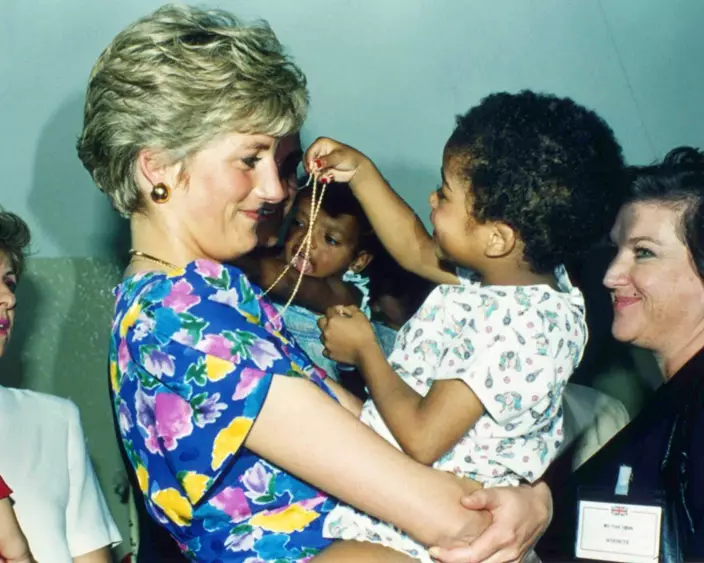
FILE - In this April 24, 1991 file photo, Britain's Princess Diana, the Princess of Wales, hugs and plays with an HIV positive baby in Faban Hostel, San Paulo, on the second day of her visit to Brazil.
(AP Photo/Dave Caulkin, File)
Today's celebrities in every field have adopted that model — created when newspapers and the evening news were the primary sources of information — and pumped it full of steroids in the world of Facebook and Instagram.
"You can sort of trace the molecular chain or genetic chain between Diana and Kim Kardashian," said sociologist Ellis Cashmore, the author of "Elizabeth Taylor: A Private Life for Public Consumption."
"Imagine if Twitter or Facebook had been around in (Diana's) day!"

FILE - In this Monday, March 17, 1997 file photo, South African President Nelson Mandela, left, shows the way to Princess Diana, during a meeting in Cape Town. (AP Photo/Sasa Kralj, File)
While every wannabe celebrity today posts their secrets on social media, in the 1990s it was unimaginable that a royal would share personal hopes and fears with the world. But trapped in a loveless marriage, Diana chose to take her message to the people who loved her.
She covertly cooperated with biographer Andrew Morton to get her story out, using an intermediary who recorded tapes of her answers to the author's questions so she could deny ever having spoken with Morton.
"This was a quite remarkable thing that she was doing," Morton told The Associated Press. "Here she was, talking about the most intimate details of her life — about this woman called Camilla, about her eating disorders, about her half-hearted suicide attempts — to me, who was a relative stranger. ... She was talking about things which no princess had ever spoken about before."
The gamble paid off. Diana's story was told, and the public loved her all the more. Her funeral featured an unprecedented outpouring of grief and emotion, with tens of thousands lining the streets and mountains of flowers piled outside Kensington Palace. It was a transformative event for both the royal family and for Britain, Morton said.
"No longer were we seen as the stiff-upper-lip, do-not-touch nation," Morton said. "We were seen as a trembling lower lip (nation), not afraid to emote, to shed our tears in public."
After Diana's death, the royals also learned they had to change.
Queen Elizabeth II returned to the capital from vacation in Scotland and gave a speech from Buckingham Palace that quieted days of headlines accusing her of being indifferent to Diana's death. A more accessible monarchy has followed.
Last year, as Britain celebrated the queen's 90th birthday for months, the queen joked at a street party outside Buckingham Palace that while she appreciated the cards and messages, "how I will feel if people are still singing 'Happy Birthday' to me in December remains to be seen!"
As William and Harry grew up, they inherited Diana's ability to communicate with the public. To the delight of mental health charities, they and the Duchess of Cambridge have fronted a campaign to persuade people to open up about mental health struggles. One charity, Mind, said the day after Harry spoke about his struggles following his mother's death their public inquiry line received a 38 percent increase in calls.
"It shows how far we have come in changing public attitudes to mental health, that someone so high-profile can open up about something so difficult and personal," said Paul Farmer, the chief executive of Mind.
The young royals have also brought other luminaries into the conversation. In one video, Prince William spoke with pop star Lady Gaga, who told of her struggles with post-traumatic stress disorder.
Diana "knew, even from an early age, that she wanted to groom them more in the image of modern princes, that they would be able to reach out to people," said Morton. "She did not want a ... do-not-touch sign over the future of her children."
Diana also changed the public's expectations of national figures, Cashmore said, noting that Britons are no longer satisfied with a distant monarchy. Her sons' common touch is one reason for the often-denied speculation that William will take the throne after the queen's death, skipping his less popular father.
Quite simply, Diana changed the royal family, said Jenny Glossop, a fan from Worcestershire who visited the Kensington Palace dress exhibit.
"The royals were always formal and stuffy and didn't have a connection with the public. Diana came along, joined the family and changed the royals forever, because after that even the queen softened, became more approachable," Glossop said. "Her boys have grown to be Diana's boys. Everything we loved about her carries on in the family.
LONDON (AP) — Millions of voters in England cast ballots Thursday in an array of local elections, the last big test before a looming U.K. general election that all indicators suggest will see the Labour Party return to power after 14 years in the wilderness.
Prime Minister Rishi Sunak was barely able to point to any big success for his Conservative Party, confirming that the electoral coalition that gave the party a big win in the 2019 general election has frayed, if not completely dissolved, in the wake of a series of political dramas and the cost of living crisis.
For Labour leader Keir Starmer, the results provided confirmation of what opinion polls have shown for two years — that Labour has recovered from its 2019 low and is on course to win the election comfortably.
Here are five things we learned:
It's possible.
Though the Conservatives lost around half the 1,000 council seats they held, and suffered a huge defeat in the special parliamentary election in Blackpool South, a coastal resort town in the northwest of England, it looks as though Sunak will not face a revolt just yet from anxious lawmakers in his party.
That's largely because the Conservative candidate in the mayoral contest in Tees Valley in the northeast of England hung on, albeit with a much depressed vote. That helped soothe some concerns despite losses elsewhere.
However, the defeat of the Conservative incumbent mayor in the West Midlands could prompt another bout of jitters among lawmakers increasingly concerned about their ability to hold onto their seats in a general election. Sunak is under pressure from different wings of the party to go further right or move to the center.
Overall, the results show that Sunak hasn't improved the Conservatives’ overall position following the damage caused by the actions of his predecessors, Boris Johnson, who was effectively ousted, and then replaced by Liz Truss, whose tenure lasted only 49 days after her economic policies rocked financial markets.
Probably in the fall.
In the U.K., the date of the general election rests in the hands of the prime minister. It has to take place by January, and Sunak has repeatedly said that his “working assumption” was that it would take place in the second half of 2024.
Though that theoretically could take place as soon as July, most Conservative lawmakers have indicated that the best time would be in the fall, when recent tax cuts may register with voters, inflation has fallen further, and interest rates may have been cut — helping to fuel an economic feelgood factor.
Waiting till the fall may also give the government a chance to cut taxes again in another budget. Conservatives will also be hoping that the controversial plan to send some asylum-seekers to Rwanda will have got off the ground and that there is evidence that it is acting as a deterrent for those seeking to make the dangerous crossing in small boats across the English Channel from France to England.
It looks like it.
In historical terms, Labour has a mountain to climb, if it’s going to form the next government. Its performance at the last general election in 2019 was its worst since 1935. Starmer has tried to bring the party back to the center of U.K. politics after the leadership of veteran left-winger Jeremy Corbyn.
Starmer’s approach has clearly worked if Thursday's results are anything to go by. Labour won control of councils in England that the party hasn’t held for decades, and was successful on a massive swing away from the Conservatives in Blackpool South, which if repeated at the general election would lead to a big majority.
Labour won in areas that voted for Britain’s departure from the European Union in 2016 and where it was crushed by Brexit-backer Johnson, such as Hartlepool in the northeast of England, and Thurrock in southeast England. It also seized control of Rushmoor, a leafy and military-heavy council in the south of England where it had never won, showing that it has a broad base of support.
It’s fair to say that enthusiasm levels are far lower than those that heralded the arrival of Labour's Tony Blair before the 1997 general election.
That may be partly because of the more challenging economic backdrop, but Starmer, formerly a human rights lawyer, lacks the razzmatazz of Blair.
It'll be tough.
One of the contributing factors to Blair’s landslide victory in 1997 came from so-called tactical voting, whereby some voters put aside their political preference and vote for whoever has the best chance of defeating the party they oppose the most. In 1997, that was the Conservatives.
Tactical voting has reemerged and was evident somewhat in Thursday's elections where Conservative candidates lost out to other parties, not just Labour, but also to the centrist Liberal Democrats and also to the Green Party.
The Conservatives may also be outflanked from the right, with Reform U.K. poised to stand candidates across Britain. In Thursday's elections, it was a minimal presence but where the party did stand, it clearly took votes away from Conservative candidates. That was notable in Blackpool South, where the Reform candidate was just shy of usurping the Conservatives into second.
Should Reform, which claims to be tougher on issues such as immigration and on Brexit, do as well in a general election, then it could lead to other parties, notably Labour, defeating Conservatives.
It certainly looks like it.
In some areas with large Muslim populations, such as Blackburn and Oldham in northwest England, Labour candidates appear to have suffered as a result of the leadership’s strongly pro-Israel stance over the conflict in Gaza.
Labour's vote share was clearly impacted, but the effect on its performance in a general election remains unclear, as those seats with a big Muslim population generally have big Labour majorities.
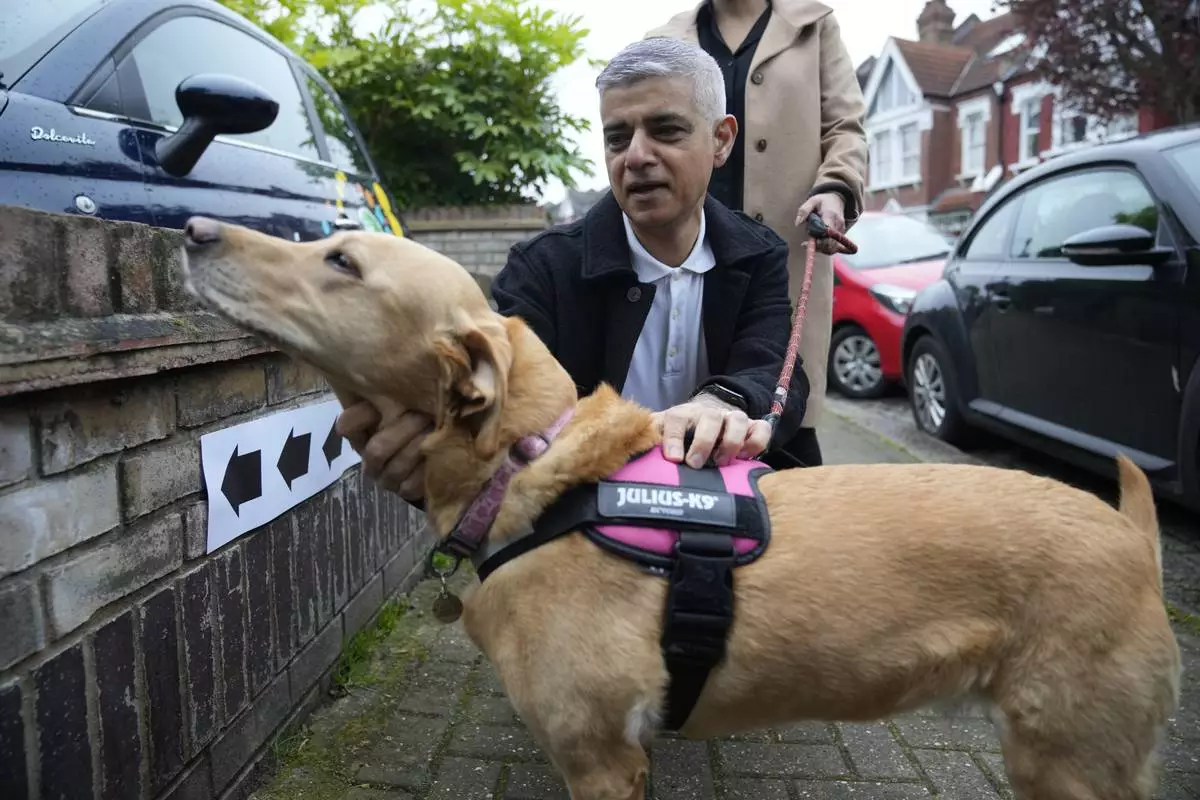
London Mayoral Labour Party candidate Sadiq Khan pats his dog Luna as they pose for the media he arrives to vote in London, Thursday, May 2, 2024. Khan, is seeking re-election, and standing against 12 other candidates for the post of Mayor of London. There are other Mayoral elections in English cities and as well as local council elections. (AP Photo/Kin Cheung)
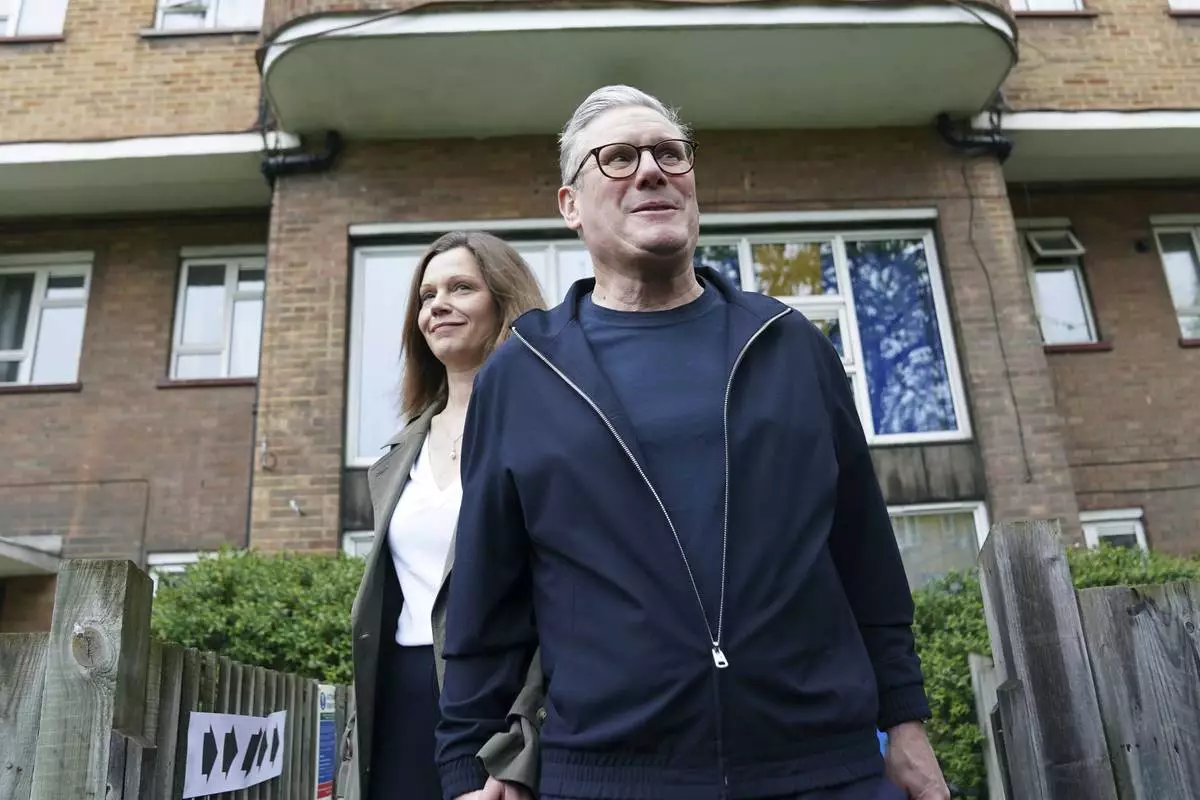
Britain's Labour leader Keir Starmer and his wife Victoria leave the polling station in his Holborn and St Pancras constituency, after casting their votes in the local and London Mayoral election, in north London, Thursday May 2, 2024. (Stefan Rousseau/PA via AP)
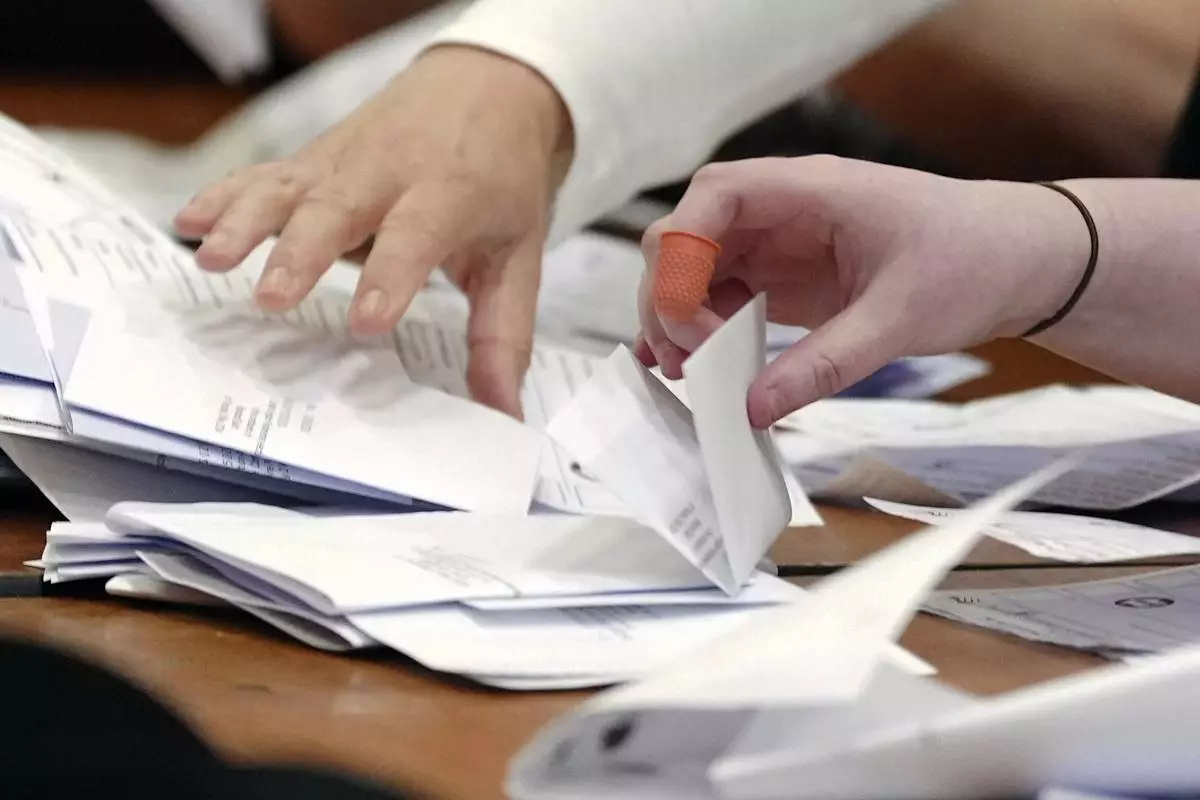
Counting begins at the Blackpool South by-election at Blackpool Sports Centre in Blackpool, England, Thursday, May 2, 2024. The by-election was triggered after the resignation of Scott Benton. (Peter Byrne/PA via AP)
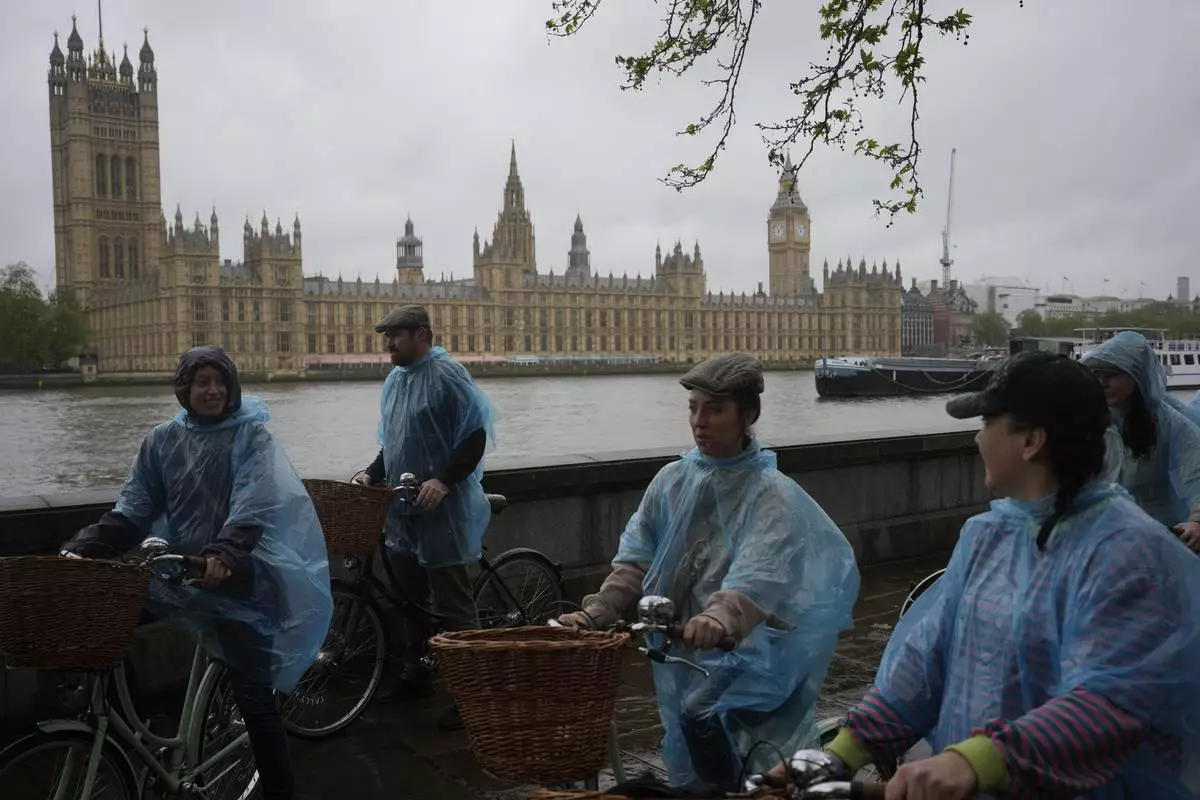
Tourists on a cycle tour in wet weather plastic macs, cycle past the Houses of Parliament, in London Friday, May 3, 2024. Britain's governing Conservative Party is suffering heavy losses as local election results pour in Friday, piling pressure on Prime Minister Rishi Sunak ahead of a U.K. general election in which the main opposition Labour Party appears increasingly likely to return to power after 14 years. (AP Photo/Kin Cheung)
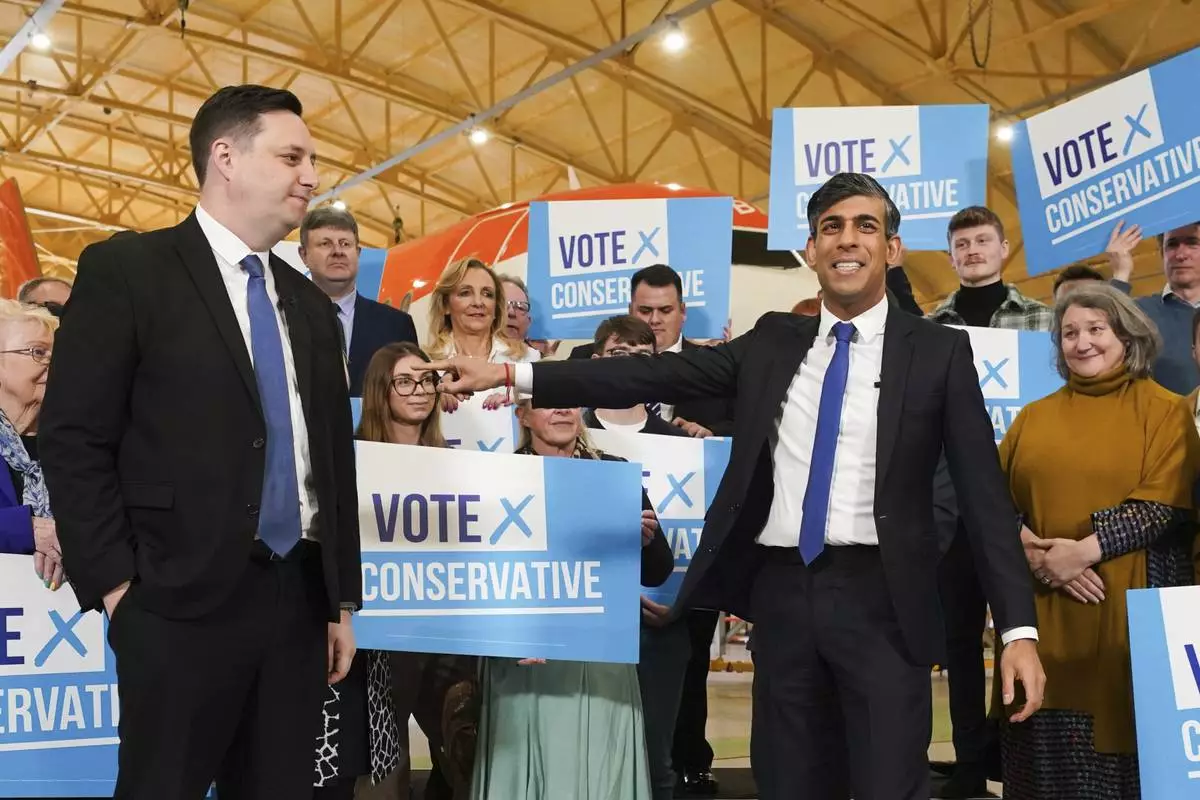
Conservative party candidate Lord Ben Houchen, left, with Britain's Prime Minister Rishi Sunak following his re-election as Tees Valley Mayor in Teesside, England, Friday May 3, 2024. (Owen Humphreys/PA via AP)
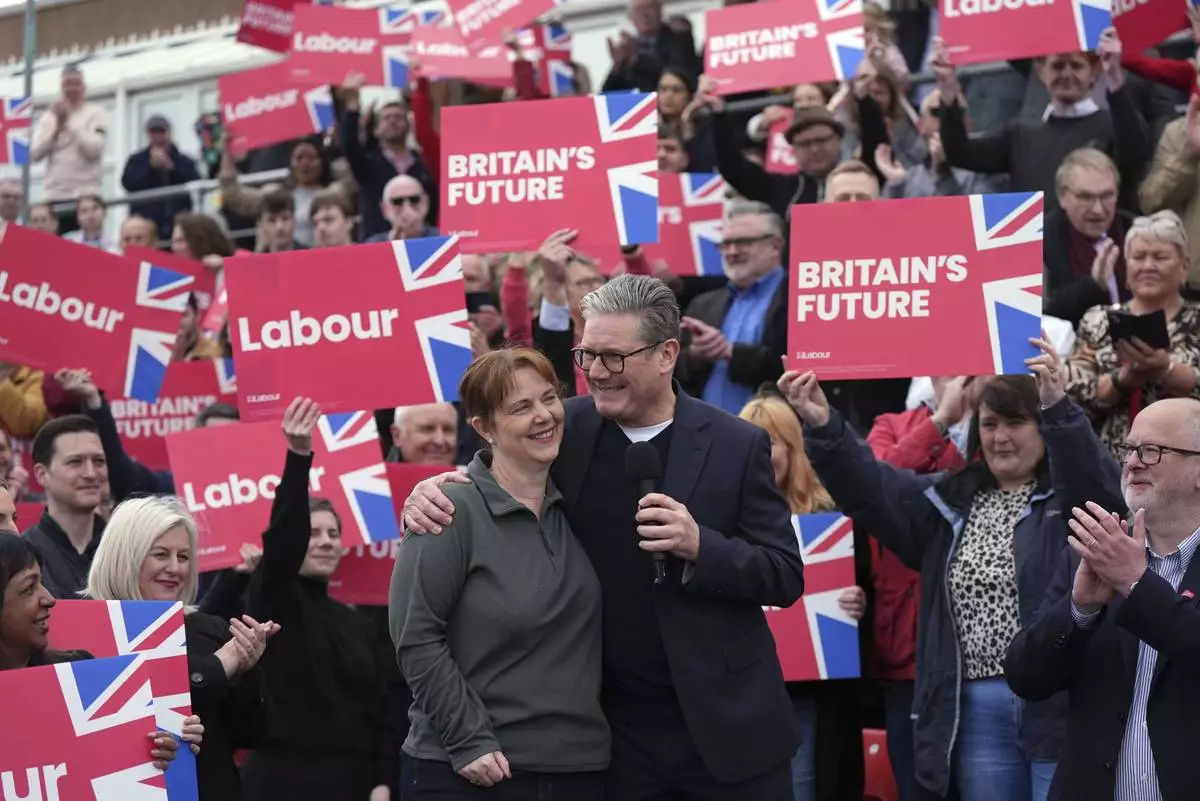
Britain's Labour Party leader Sir Keir Starmer with newly elected East Midlands mayor Claire Ward during a visit to Forest Town Arena in Mansfield, England, Saturday May 4, 2024. (Jacob King/PA via AP)
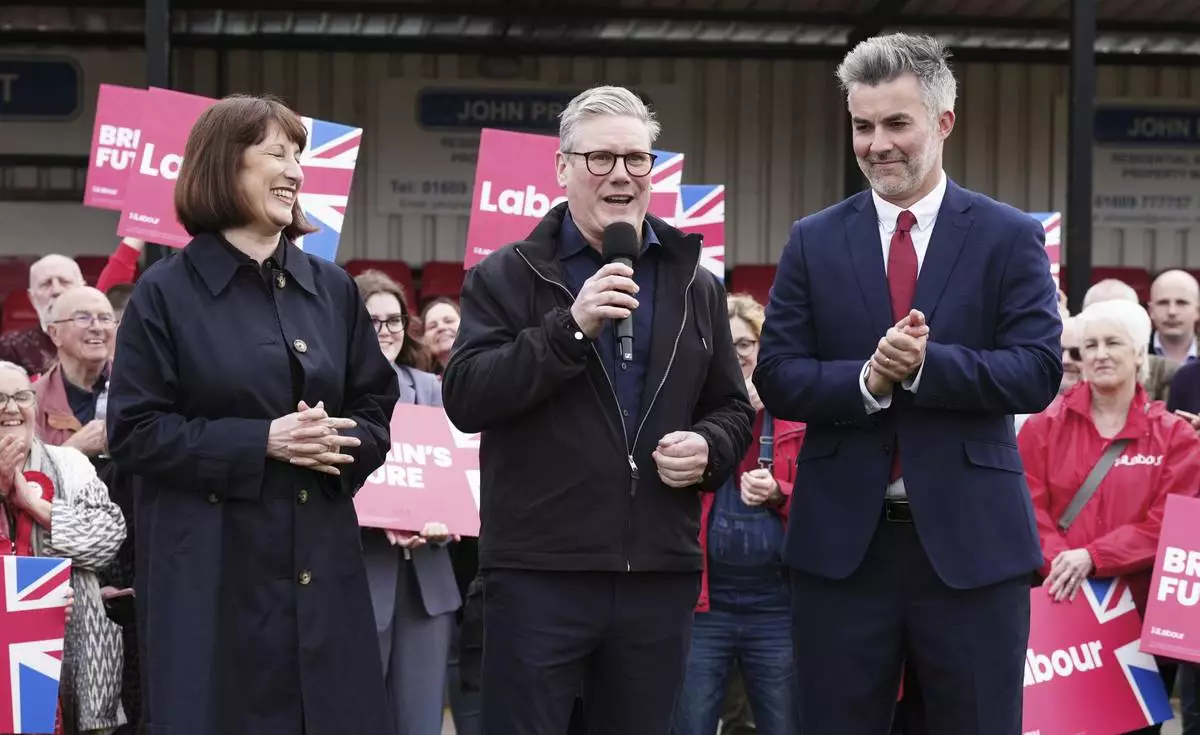
Britain's Labour Party leader Sir Keir Starmer, center, and shadow chancellor Rachel Reeves, celebrate with David Skaith at Northallerton Town Football Club, North Yorkshire, after winning the York and North Yorkshire mayoral election, Friday May 3, 2024. (Owen Humphreys/PA via AP)














